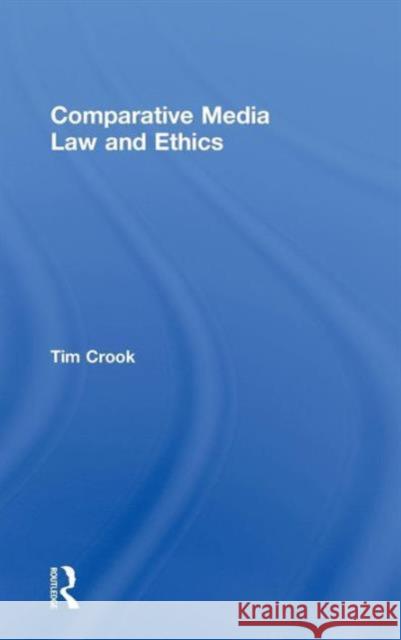Comparative Media Law and Ethics » książka
Comparative Media Law and Ethics
ISBN-13: 9780415551571 / Angielski / Twarda / 2010 / 482 str.
Comparative Media Law and Ethics
ISBN-13: 9780415551571 / Angielski / Twarda / 2010 / 482 str.
(netto: 721,53 VAT: 5%)
Najniższa cena z 30 dni: 654,86
ok. 16-18 dni roboczych.
Darmowa dostawa!
Providing practical and theoretical resources on media law and ethics for the United Kingdom and United States of America and referencing other legal jurisdictions such as France, Japan, India, China and Saudi Arabia, Comparative Media Law and Ethics is suitable for upper undergraduate and postgraduate study and for professionals in the media who need to work internationally. The book focuses on the law of the United Kingdom, the source of common law, which has dominated the English speaking world, and on the law of the USA, the most powerful cultural, economic, political and military power in the world. Media law and ethics have evolved differently in the US from the UK. This book investigates why this is the case. Throughout, media law and regulation is evaluated in terms of its social and cultural context.The book has a companion website at http: //www.ma-radio.gold.ac.uk/cmle providing complementary resources and updated developments on the topics explored.
Providing practical and theoretical resources on media law and ethics for the United Kingdom and United States of America and other legal jurisdictions such as France, Japan, India, China and Saudi Arabia, Comparative Media Law and Ethics is suitable for upper undergraduate and postgraduate study in higher education and is of use to professionals in the media who need to work internationally.
The focus on UK and USA law is justified on the United Kingdom being the source of common law, which has dominated the English speaking world and the USA as the most powerful cultural, economic, political and military power in the world. US media law and ethics have evolved differently from the UK. The book investigates why this is the case.
The international perspective is continued through an analysis of other media law jurisdictions:
- common law – focus on India- the biggest democracy in the world and largest middle class
- civil law – focus on France- the influential founder of the European Union and host country for ECHR at Strasbourg
- socialist law - focus on China- the country with the highest economic growth and largest population
- Islamist law – focus on Saudi Arabia- the most influential source of legal religiosity
Readers are directed towards an analysis of media law, as it exists, the ethical debates concerning what the law ought to be, and the historical development of legal and regulatory controls of communication. The theoretical underpinning involves a course of learning the subject of media jurisprudence- the study of the philosophy of media law, media ethicology- the study of the knowledge of ethics/morality in media communication, and media ethicism- the belief systems in the political context that influence journalistic conduct and content. The course evaluates media law and regulation in terms of its social and cultural context.
If you need to compare different law and ethics systems, are studying international journalism or want to understand the legalities of working in the media in different key jurisdictions, then this is the perfect guide.











